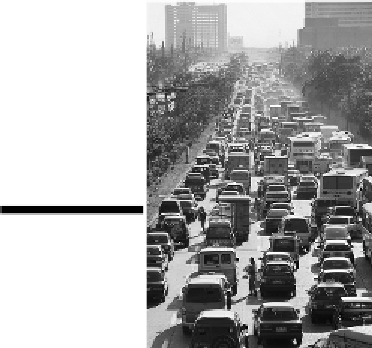Geography Reference
In-Depth Information
Automobile ownership
By themselves, neither freeways nor roads of other sorts tell the full story of contemporary urban
growth in the U.S. More telling is the number of people who own cars and use those roads and free-
ways to commute to work from a suburban residence. And that number is humongous. More than 130
million automobiles are registered in the United States and another 80 million trucks of various sorts.
According to the 2000 U.S. Census, more than 90 percent of households own a motor vehicle, and 18
percent of households own three or more.
Figure 17-3:
Freeways have
been a key ele-
ment in urban ex-
pansion in the
U.S. and some
other developed
countries.
Low-cost fuel
The price of automobile fuel in the United States is relatively low. That prompts urban sprawl by en-
couraging automobile usage and increasing the distance people are willing to commute. Now, some
people may recoil at the notion that gas is cheap in the United States. All they need to do, however,
is vacation in Europe or almost any other part of the world to find out firsthand just how inexpensive
American gas is. The principal reason for the price difference is low taxes on gas consumption in the
U.S., which encourage automobile purchases, new home construction, and other consumer activity
that contributes to the economy even as it contributes to urban sprawl.
Home mortgage deductibility
The U.S. federal government has long encouraged home ownership by allowing buyers to deduct
from their federal income tax the interest paid on home mortgages. The effect is to encourage new


